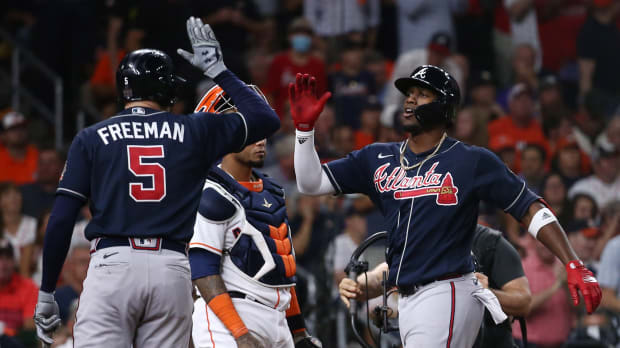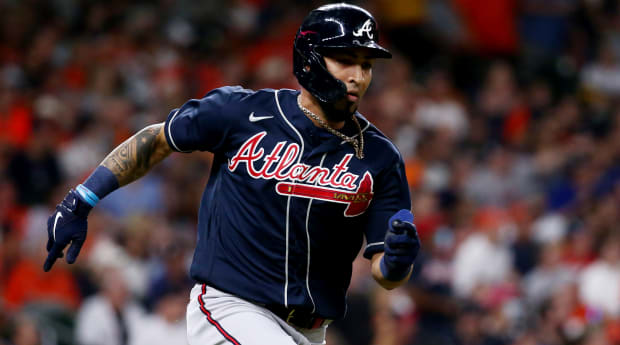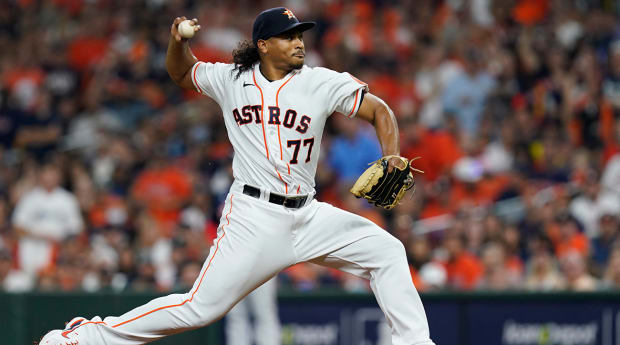A lot of emphasis has been placed on scoring first this postseason, and rightfully so; the teams that score first are 26–7 so far in the playoffs.
What’s interesting, though, is how frequently we’ve seen teams score early. In 26 of the 33 playoff games this year, at least one of the teams has scored in the first or second inning. The team that’s done so first in those games is 20–6.

Troy Taormina/USA TODAY Sports
But even beyond the postseason aggregate, the first two innings could tell you everything about how tonight’s game will play out. I’ve written the last two newsletters about how the Astros have the upper hand in the World Series because their pitching is in better shape and their hitters are so good at making adjustments the more often they see the same pitchers in a series. These two advantages will be even more pronounced if they score early off Ian Anderson, one of Atlanta’s two remaining true starters following Charlie Morton’s season-ending injury in Game 1. If Houston gets an early lead, and manager Brian Snitker either has to pinch-hit for Anderson early or relieve him mid-inning, Atlanta’s top relievers could become overextended before the team even gets to its bullpen game tomorrow night and possibly Sunday night, too.
The flipside of this is also true. If Atlanta scores first within those first two innings, Snitker could be more willing to ride Anderson a little bit longer, knowing that he’ll need to rely upon the bullpen trio of Tyler Matzek, A.J. Minter and Luke Jackson, as well as Kyle Wright, Drew Smyly and Tucker Davidson, the three of whom could be used as potential openers or bulk guys in Games 4 and 5. Another reason for Atlanta to score early has nothing to do with how well Anderson pitches; the game is at Truist Park, so there is no designated hitter. If it gets to the third or fourth inning and this is a scoreless or low-scoring game, Snitker might be forced to pinch-hit for Anderson if there are runners in scoring position. If that’s the case, whether or not the pinch-hitter drives home the runners, Atlanta would have to turn to its relievers earlier than it would like.
If you want to ignore the Atlanta pitching situation entirely, one thing to focus on over the first two innings is Houston starter Luis Garcia’s fastball. He hurt his knee in ALCS Game 2 and left the game in the second inning, which prompted pitching coach Brent Strom to change how Garcia stands on the pitching rubber. The adjustment was meant to take pressure off his knee, but this also increased his fastball velocity. In the regular season, his average four-seamer was 93.3 mph; in ALDS Game 6, he maxed out at 97.8 mph and averaged 96.
Garcia’s velocity could make all the difference in tonight’s game. This season, Atlanta hitters slugged .506 against four-seamers from right-handed pitchers, good for fourth-best in the majors. But their production dipped pretty dramatically against right-handed pitchers whose four-seamers had a velocity of at least 95 mph. Just look at this.
ATL vs. RHP Four-Seamers

This will be the key to the game. If Garcia comes out firing 96–98, Atlanta hitters will have a tough time scoring. Except, there’s no guarantee that he’ll have the same velocity tonight that he had in Game 6. It’s difficult to make mechanical changes at any point, but that’s especially true this late in the season. Will Garcia revert back to his old habit of pointing the ball of his foot slightly toward home plate, causing him to put more strain on his knee and thus limiting his velocity? If he does, Atlanta could feast on his diminished fastball and provide an early cushion for its pitching staff.
Have any questions for our team? Send a note to mlb@si.com.
Editor's note: A technical issue with all of SI's emails may have prohibited you from receiving editions of the Five-Tool Newsletter from this week. If you'd like to go back and read earlier editions, you can find them here:
- The World Series Is Even—but the Scales Favor the Astros
- Astros Have Advantage Despite Braves' Win
- Everything You Need to Know Before the World Series
- Awaiting the World Series on the Day Before
1. THE OPENER
“The Braves know that their starter for Game 3 of the World Series will be Ian Anderson. After that … well, it’s complicated.”
So begins Emma Baccellieri’s excellent breakdown of Atlanta’s pitching conundrum for the rest of the World Series. She explains how the loss of Charlie Morton leaves the team with few options to replace him and with questions about how the heck it can cover the innings and contain Houston’s deep lineup.
Read Emma’s entire story here.
2. ICYMI
If you didn’t get a chance to read Stephanie Apstein’s Daily Cover story yesterday about the tomahawk chop, I encourage you to do so before tonight’s Game 3 at Truist Park.
Why Does MLB Still Allow Synchronized, Team-Sanctioned Racism in Atlanta? by Stephanie Apstein
During World Series Games 3, 4 and 5, a nationwide television audience will see a largely white crowd mocking a people its ancestors tried to erase.
Need to review what happened in Wednesday’s Game 2 before tonight’s game? We’ve got you covered.
From One Mr. October to Another: Jose Altuve Snaps His Slump With the Help of a Playoff Legend by Tom Verducci
Houston's Game 2 victory was aided by some advice from Yankees icon Reggie Jackson to its star second baseman.
Braves' Big Blunder Puts Game 2 Out of Reach by Stephanie Apstein
Houston evened up the World Series with some help from a rare, costly error by Atlanta's infield defense.
Miss Tom’s brilliant Dusty Baker profile from Tuesday? Here you go!
Dusty Baker's Time Is Now by Tom Verducci
His managing is defined by having won more games without winning the World Series than anyone in history. His story is about more than the one thing its missing.

Troy Taormina/USA TODAY Sports
3. WORTH NOTING
It’s going to be interesting to see how each team handles not having a designated hitter this weekend. Houston’s Yordan Alvarez almost certainly will be starting in left field, despite his defensive limitations.
The real thing to watch for is which of the four Atlanta outfielders is left out of the starting lineup over the next three games. Before Jorge Soler tested positive for COVID-19 before NLDS Game 4, Joc Pederson was used off the bench, even against right-handed starters. By the time Soler came back, before NLCS Game 5 against the Dodgers, Joctober was in full swing and Soler was eased back in as a pinch-hitter. Because of the DH, Brian Snitker started the four of them in the first two World Series games: Eddie Rosario in left field, Adam Duvall in center, Pederson in right, Soler at DH. Now, he’s got to make a decision.
At least for tonight's Game 3, this is what Snitker decided: Rosario, Duvall and Soler, from left to right, with Pederson as the odd man out. This makes sense, considering Pederson has cooled off over the past five games (2-for-19, 7 Ks). Plus, he is comfortable coming off the bench. He went 3-for-3 with two home runs as a pinch-hitter in the NLDS.
4. WHAT TO WATCH FOR from Will Laws
The Braves, who have yet to lose at home this postseason, will take over hosting duties in tonight’s Game 3 (8 p.m. ET, Fox). Atlanta’s Ian Anderson and Houston’s Luis Garcia will combine for the first World Series matchup between rookies since Game 1 in 2006 (Detroit’s Justin Verlander vs. St. Louis’s Anthony Reyes), and just the eighth all-time, according to MLB.com’s Sarah Langs.
Garcia didn’t last past the fourth inning in either of his first two starts in these playoffs, allowing five runs in both, but twirled 5 ⅔ innings of shutout, one-hit ball against the Red Sox in the ALCS clincher. In between, Astros coach Brent Strom instituted a change in Garcia’s windup, keeping the 24-year-old’s plant foot directly parallel to the rubber to minimize the stress on his barking knee. Just like that, Garcia’s fastball hit 97 mph on the radar gun eight times in his most recent start after doing so just once all regular season, though it did happen less frequently as the night went on. If the young righthander with a five-pitch mix can use the mechanical adjustment to keep his velocity cranked up and his knee healthy, Houston’s rotation—its most glaring potential weakness heading into this series—will have flipped into an advantage.

Thomas Shea/USA TODAY Sports
5. THE CLOSER from Emma Baccellieri
With the potential for the universal DH to become a reality when the CBA expires in December, the next three games could be the last ever played in which the pitchers have to hit. And the occasion is not lost on them.
“It’s definitely going to be pretty special that this could be the last pitchers ever hitting in baseball,” Atlanta Game 3 starter Ian Anderson said yesterday. The 23-year-old had two hits this year, a single and a double, for a batting average of .054. But even if his ABs end in a strikeout, as they usually do, he’ll have a reason to savor them.
That’s all from us today. We’ll be back in your inbox tomorrow. In the meantime, share this newsletter with your friends and family, and tell them to sign up at SI.com/newsletters. If you have any questions or comments, shoot us an email at mlb@si.com.